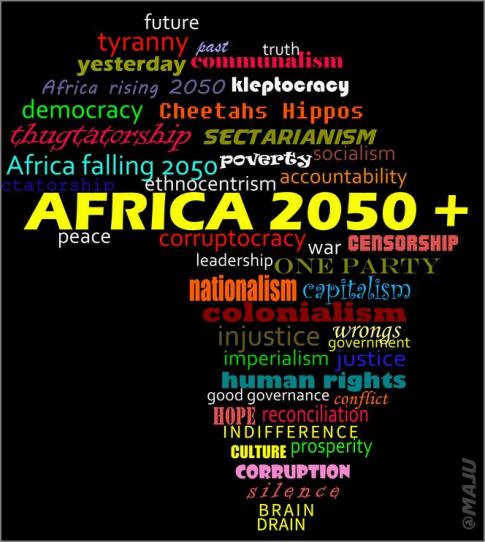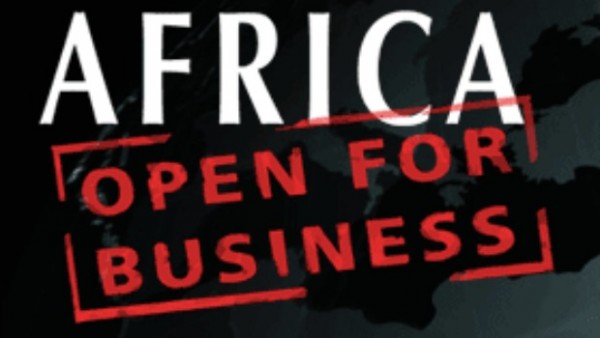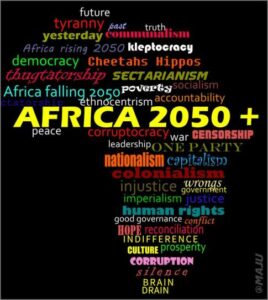Young South Africans: ‘They’re showcasing your poverty’
August 03, 2016Johannesburg, South Africa – In the early morning chill, 19-year-old Naledi made her way past the election posters plastered along the streets of downtown Johannesburg to the foot of the Nelson Mandela Bridge. The night before, a crowd of South Africa's business elite had bedded down in sleeping bags and boxes, as soft jazz played from speakers and volunteers distributed hot towels outside portable toilets. It was a bid to show they cared about people like her. And now she was coming to collect what they had left behind.
At the CEO SleepOut, a corporate charity event in Johannesburg held just days before South Africa's municipal elections, government dignitaries and business leaders spoke about their concern for the less fortunate and shared their plan to push the country forward. On a stage set up among fake shacks serving soup, hot chocolate and branded fleece hats, Graeme Stephens, the CEO of Sun International, a luxury hotel and casino conglomerate, congratulated participants for braving the cold, hail and “the EFF”.
Outside the metal turnstiles set up at either end of the bridge, where private security waited to accompany participants to their cars, the police had just dispersed a crowd of students with stun grenades and rubber bullets for trying to demonstrate against the event. Many of the young protesters sported the red berets of the Economic Freedom Fighters (EFF), an opposition party which has tapped into the anger and frustration of black youth in the country. While the CEO SleepOut raised funds for selected foundations, the students saw the event as a mockery of young black students facing actual homelessness due to high university fees and accommodation costs.
The “born-free” generation, brought up in a democratic, post-Apartheid South Africa, is growing increasingly disillusioned with the promise of a rainbow nation, with continuing inequality and a soaring unemployment rate hitting young people the hardest. Many voting for the first time in this election are supporting opposition parties that are challenging the African National Congress (ANC), which has been in power for more than two decades. These born-free voters, from young SleepOut participants to the homeless youth collecting donations, are setting the course for the future of South Africa while living vastly different realities.
Koketso Poho, Thapelo Mawasha, Siphiwe Shange
‘They're showcasing your poverty'
“They're showcasing your poverty!” shouts Koketso Poho, who was wearing the red beret of the EFF as he led students through the streets towards the Nelson Mandela Bridge. “They want to sleep on the street when they have fancy houses.”
“Accommodation is land!” declared the protest signs, linking the high fees many say are keeping young black students from university with the dispossession of black people under Apartheid. In the run-up to the election, EFF leader Julius Malema asked citizens to “stop voting for T-shirts and food parcels” and promised to put land and resources back in the hands of black South Africans.
READ MORE: South Africa's local elections – what you need to know
As students squared up to the private security at the bridge, pushing railings aside with the hope of addressing the people at the event, the loud bang of a stun grenade and a plume of smoke split the crowd. Officers emerged from police vans, guns drawn, shooting at the backs of running students, while a few picked up rocks to retaliate.
Face-to-face with a police officer in the aftermath, Thapelo Mawasha, a 19-year-old law student at the University of Witwatersrand (Wits), confronted him about how he could shoot at young black students.
“You, as a black police officer, a black parent – why aren't you being empathic to our struggle?” he asked, his question echoing the frustrations some young black South Africans say they feel with the old guard of the ANC party, which they believe has sold them out.
Many of his fellow students at Wits are struggling to continue their degrees due to the high fees and costs of housing, he says. Some have been locked out of their rooms for not paying and are sleeping in 24-hour study rooms, showering in gyms and even ending up on the street.
“The sleep out, it's a facade to make them seem like they're humble, that they experience what we experience,” says Mawasha. “But they're safe behind those fences – the person who sleeps on the street every day doesn't have protection, doesn't have police closing the roads for them.”
This election will be Mawasha's first time voting, and he is considering all the parties carefully, he says, although the EFF does impress him with their support for struggling students.
A few days after the protest, sitting in the hall of a Wits campus residential building where she lives, 19-year-old Siphiwe Shange, a member of Wits' EFF chapter, spoke about the pressures she faces as a young black student.
“Go to varsity, go get a job, go be that CEO of a company,” she says is the message drilled into young black people. But the odds still feel stacked against them.
Her course demands that she travel to practicals around the city, and she often has to pool money with other black students for a taxi or get there by public transport, while most of the white students drive. If black students struggle to finish work or if they turn up late, she says, they're considered lazy. But she knows many of her friends are working jobs on the side in order to pay their fees.
READ MORE: What now for South Africa's #FeesMustFall movement?
From a small town in KwaZulu-Natal, she counts herself lucky to have campus accommodation. But half her fees still have to be paid this year, and she doesn't know how she is going to find the money, having already asked for support from her sister and parents. She joined the protest against the CEO SleepOut because she believes it is emblematic of a broken system.
“Why couldn't they centre the struggle around the people affected?” she asks. “People need accommodation, security of life; they don't need a mockery of their situation.”
The students also marched in solidarity with underpaid workers and, she says, wanted to reach out and engage those who are homeless too. For her, the EFF is supporting the struggle of young black people against what she says is still a “white capital monopoly” in South Africa.
“It gives me hope to say we have a voice,” she says of the party, “and that more and more people are willing to listen.”
Bianca Barella
‘I don't understand why they had to come out and protest'
At midnight on the bridge, Bianca Barella, a 19-year-old sponsored to attend the sleep out as an “outstanding student” by Eqstra Holdings, was busy assembling the DIY cardboard shelters provided for those attending.
The cardboard was branded with the logos of Water Fall City, a private development project hyped as the new business hub of the Gauteng province. A jobless older woman, along with a handful of others, wearing signs advertising the motto: “Developing cities, changing lives”, said they had been paid 100 South African rands, less than $10, each to stand by the bridge for hours before the event as diverted traffic passed by.
“I thought it would be easier,” Barella says of putting the box shelter together. “It must be really hard,” she says of living on the streets. Her friend sticks her head out of a pop-out window in the cardboard shelter. “It's more fun than I expected,” she says. “It isn't that cold yet.”
Though she didn't see the protest, Barella had heard that the EFF was “doing the same stuff they always do”, and that the situation had become violent. “This event isn't about race or anything, it's just about helping people who can't help themselves, so I don't understand why they had to come and protest,” she says. “I think they were trying to get attention, but it's just unnecessary.”
It should be her first time voting, but Barella has decided not to. She says politics isn't her thing. “I think that the politics in South Africa are very bad,” she says. “I don't think our votes count for much because the same party wins every time.”
The “one good party” in her opinion is the Democratic Alliance, the opposition party already in power in Cape Town, a city where racial and economic inequality is stark. “They really cleaned it up,” she says.
The biggest challenge right now for young people is trying to get a decent job, she says, because even with the best qualifications, work is scarce. She agrees with the protesters that university fees should not be raised, but thinks the way people have been demonstrating is “not appropriate”. On the 40-minute drive from her family home to the University of Pretoria, where she studies education, Barella says she passes at least 10 homeless people every day. “You see a lot,” she says.
Asked what it's like to be a young white South African, and what she feels about the racial and economic divides many speak of, she says she sees it and hears about it, but it's not something that affects her.
“You don't really have to deal with it as such, because of the school you went to and the people you hang out with,” she explains. “You're all level.”
At her university, there is a greater variety of people, she says, adding that “you still find your own clique”.
“At varsity, it's quite nice because no one talks about that kind of thing – well, not at the one I go to. With the youth, no one's going to judge you on your colour or how much money you have; it's the person that you are.”
Naledi
‘You never know life until it hits you'
On the night of the CEO SleepOut, 19-year-old Naledi, who was wearing a thin hoodie and grey sweat pants, had curled up on the usual patch of concrete a few blocks from the bridge. She hadn't known that a few streets away, wealthy people were sleeping in boxes in supposed solidarity with her plight, or that students had been protesting in the name of young people like her.
In the morning, someone told her that donations were being given out at the bridge, so she came to collect what she could – a few brown paper bags stuffed with a sleeping bag and some clothes. Last year, she had been accepted to study nursing at the University of Johannesburg, but after applying for government funding, wasn't granted the financial support she needed to attend. She asked for only her first name to be used, worried it might affect her applications.
For two months she has slept rough on the streets of Johannesburg, after coming to the city of gold from her home in Eastern Cape.
“That's camping, that's nothing,” she says, watching workers clear away the rubbish from the event. “They haven't experienced it; they don't understand. You never know life until it hits you.”
This year's election was meant to be her first chance to vote. When she came to the city, she found work with the Democratic Alliance, earning around $35 a week at their call centre, where, day in, day out, she would speak to voters about the party's promises. She was hoping to vote for them too. But when the work dried up, she could no longer afford to pay rent to the friend she was staying with. On one of the first nights that she was homeless, her bags were stolen, along with her phone and her identification documents. Without her ID, or the money to get a replacement, she has no way to vote.
For now, she relies on local churches for food donations and uses public bathrooms in bus stations and downtown streets to wash in. This month, she should be reapplying for government funding to attend university, it's a challenge without a phone or access to the internet. It's not easy to access free wi-fi and charging stations while homeless, which were provided for those sleeping out on the bridge. But she isn't going to give up.
“Hopefully, they'll take me this year,” she says. “I want to see myself succeed. That's why I'm going to university.”
WATCH: Are South Africa's students the key to real change?
Her brother is a 22-year-old business graduate but still hasn't been able to find work. When she does manage to make money, she always sends some of it home. Her mother wants her to be a nurse, but her dream job is to be a chef on a cruise ship. She was accepted into a private culinary school last year, but again, didn't have the money to attend.
“I believe a person has to change themselves, that it's up to a person to wake up and make an effort to get stuff, not just wait for it to come to you,” she says.
A security guard on the bridge told her he might be able to help her get some work and gave her a number to call. Every day is a hustle to make some money, with the hope of being able to eventually continue her studies.
“I believe one day I will be OK,” she says. “I will.”
When it comes to the election, she believes the older generation, like her mother, will vote for the same parties they always have. But she trusts that young people are bringing change. “It's only our generation,” she says. “We can choose what we want.”
The author reported from South Africa through a fellowship with the International Reporting Project.
The post Young South Africans: 'They're showcasing your poverty' appeared first on African Media Agency.
Source:: http://amediaagency.com/young-south-africans-theyre-showcasing-your-poverty/


















